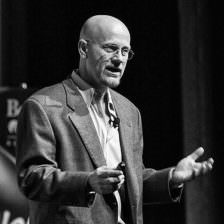If Web 2.0 was the moment when the collaborative promise of the internet seemed finally to be realised – with ordinary users creating instead of just consuming, on sites from Flickr to Facebook to Wikipedia – Web 3.0 is the moment they forget they’re doing it. via SXSW 2011: The internet is over
“Web 3.0 is the moment they forget they’re doing it.”
That’s a powerful statement. Though I don’t think we’re anywhere near that.
Of course The Technorati feel we’re much closer than we actually are. The truth is that there is still a major divide between those who are “using” social media and those who are not. “According to the Pew Internet and American Life Project, 39 percent of U.S. adult Internet users still aren’t on Facebook, or Twitter or a similar service.” – MSNBC

That’s 4 out of every 10 people who aren’t even on these popular services. I wonder how many who are would count themselves among those who “forget they are doing it.” I wouldn’t count myself in that crowd. I don’t forget I’m doing it. But I also know I’m a part of a small minority of people who are avid social media users, but are still concerned about privacy.
I can see the writing on the wall though. Socia network users are increasingly less concerned with privacy. According to the MSNBC study, “Among active social network users, 58 percent said privacy was less important and only 14 percent said its importance was growing.” So, if we’re headed toward a world where “the internet” is invisible and we forget that we’re even sharing all of this personal information, it makes me wonder what happens next.
- What happens when there is no distinction between what we are willing to share with strangers and with friends?
- What happens once we forget that we’re leaving intimate details of our lives strewn all over the internet for anyone to find?
Maybe I’m being overly dark, but I’m not sure this vision of Web 3.0 is the utopian dream world some in the technorati might hope it to be.
[ Photo credit: MouseBoyWithGlasses on Flickr ]

That was an interesting read (SXSW…) and this excerpt was insightful:
“It was proof, (Clay) Shirky argues, that social media can’t be revolutionary on its own. “The reason that worked is that nobody knew anybody else,” he says. “They thought Facebook itself was trustworthy.” This is one of many counter-intuitive impacts that the internet has wrought on the politics of protest. But perhaps the most powerful is the one that Shirky – himself a prominent evangelist for the democratic power of services such as Twitter and Facebook – labels “the dictator’s dilemma”.”